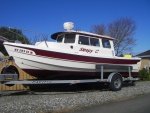Electric over hydraulic (the only consideration for "electric" brakes on any vehicle which is going to be immersed in water). The electric brakes such as used on house trailers are just not up to full immersion--they may last a few times, but the water will get into the "sealed" units, and rust them out.
If you are driving over the Western Mountains with a 10,000 lb load--or maybe even a 7,000 lb load, then consider the Electric over hydraulic--but with relitatively level towing, as I suspect you have, the surge brakes will be fine on a C Dory 22.
Fitting a second axle--it is not quite that easy--the trailer frame has to be set up for the second axle--you will have to put on different fenders. The procedure will be different for leaf spring vs torsion axels. You will have to put brakes on both axles (state laws in many states).
If you are buying used, there are going to be some compromises. If you buy new, then you can have everything you want--dual axles, type of frame and brakes, type of engine, electronics, stoves, color of hull, cushions, camper canvas, etc---but you will pay a lot of money for the difference, and it will probably not have much affect on the enjoyment you get out of the boat.
Our recent C Dory has a single axle-and the boat just towed to the Keys, which weighs about the same as a C Dory 22, light, has a single axle. They tow fine, if properly balanced. Both have new tires on them, brakes are in good shape, I drive at 55 mph to 57 mph (Calif trailer speed is limited to 55 MPH, so I am used to that). I check the tire pressure every day, check the tire and hub temp every 2 hours with an IR thermometer.
The beauty of a C Dory 22 is that it is a simple boat. You can keep it simple, with a single engine, single axle trailer etc, or you can make it very complicated...your choice.

